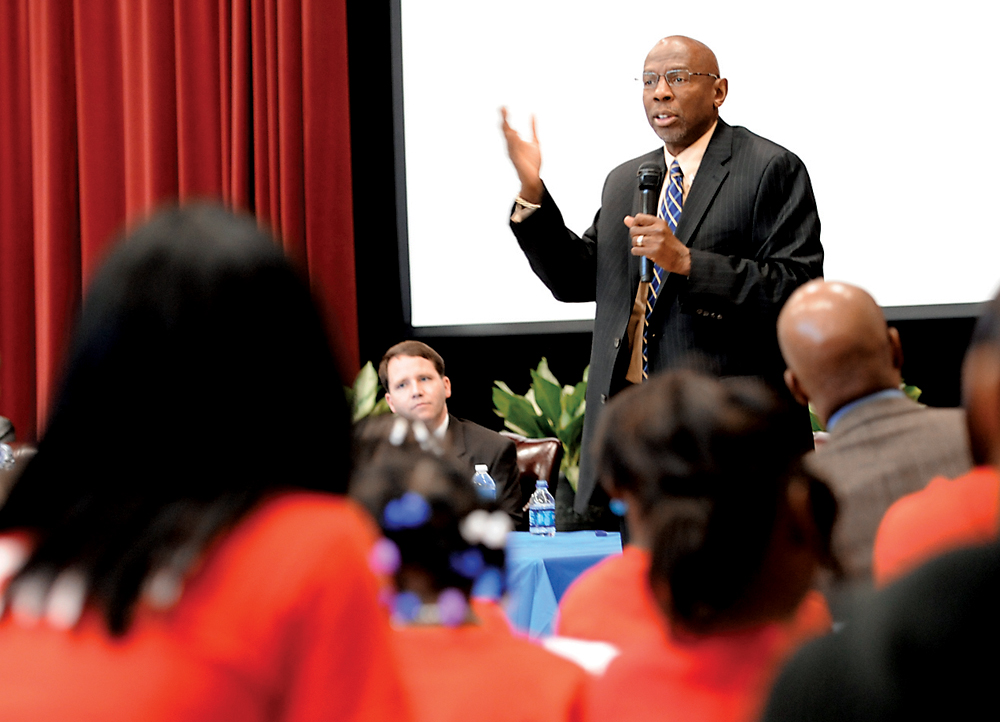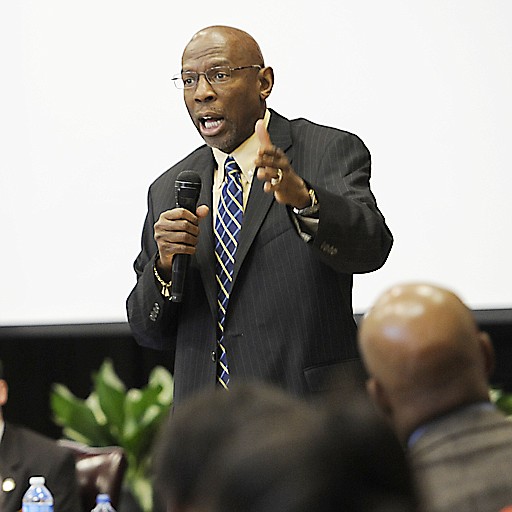 Staff photo by Jenna Walker/Chattanooga Times Free Press - Feb 15, 2011 -- Geoffrey Canada, the president and CEO of Harlem's Children's Zone, speaks to an audience including Girl's Inc., Tuesday afternoon at Hardy Elementary in Chattanooga, Tenn. Canada urged Chattanooga residents to provide a better education for their children.
Staff photo by Jenna Walker/Chattanooga Times Free Press - Feb 15, 2011 -- Geoffrey Canada, the president and CEO of Harlem's Children's Zone, speaks to an audience including Girl's Inc., Tuesday afternoon at Hardy Elementary in Chattanooga, Tenn. Canada urged Chattanooga residents to provide a better education for their children.If education can turn around the poorest neighborhoods in Harlem, there's no reason it can't do the same in Chattanooga.
That was the no-nonsense brand of education reform that social activist Geoffrey Canada, president and CEO of the Harlem Children's Zone, brought here Tuesday.
"If we don't fix [education], we're not going to continue being a superpower," Canada told those present at his lecture Tuesday evening at the University of Tennessee at Chattanooga. "Over the past five years, I've met several presidents, several secretaries of education ... and there is no plan. If you want to save your children, you're going to have to do it yourself. It's just us."
Prior to his speech as part of the George T. Hunter Lecture Series, Canada first spent an hour in the gymnasium at Hardy Elementary School, participating in a question-and-answer session packed full of parents, teachers and community members.
Canada, who is featured prominently in the recent documentary "Waiting for Superman," told the audience at Hardy that the issue of poor education outcomes in certain communities isn't unique to Chattanooga.
"What we find across the country is that we've allowed certain kids to fail and that failure has no penalty; in poor communities that have struggled, there is no penalty for failure. In fact, failure is the norm, and it's been going on for so long that it's expected," he said. "It's difficult to talk about. Often there's race involved, there's class involved ... so people talk around the topic."
Notable quotes from his speech:"When you don't know quite what to do, do what rich people do. I have yet to meet any adults who are wealthy and have three kids who say: 'Harvard, Yale or hairdressing school?' ... That's our job, that's what we get paid to do; we have one set of expectations.""If you go into a community that has challenges ... it is my professional duty [as a teacher] to make sure those kids learn. I can't blame the parents, can't blame the environment, can't do it. If these kids don't learn, it's our fault. ... If we can't fire the lousy teachers, then we should send them all to the upper-middle class neighborhoods ... in the end this is about real accountability. If you take the money [to teach], you're responsible for those kids.""If you have a school where kids are behind and they're in school the same number of days that other kids are in school ... why would we expect these kids to ever catch up? They have never caught up anywhere in America. We've got to rethink schools, but no one wants to do that. You know what we do instead of rethink schools? We fire superintendents.""We decided we didn't know how to save everybody, but we could save some people ... there are 11,000 kids in our area, and those are my kids. Those are the kids I'm going to save."
When Canada started the Harlem Children's Zone in 1997, he took 24 blocks of the poorest neighborhood and provided each child with $5,000 a year of extra educational services from birth through college. The successful program has now expanded to 100 blocks of Harlem, and is being used by President Barack Obama as a model for education reform around the country.
"We intentionally work with children whose parents we know are not going to be able to support them. We went to the places where we knew the parents didn't have it together ... when you give people like me money to educate your kids, then you've got to hold me responsible for educating those kids. That's the point of being a professional," he said.
Leaders with the Ochs Center for Metropolitan Studies hope to replicate Canada's success in Chattanooga through a program called the Chattanooga Promise Zone, whose epicenter would be Hardy Elementary.
Canada told the group at Hardy, many of whom hope to be involved in the efforts, to start small.
"My theory is to start small, but get those small victories in," he said. "It's routine, it's regular and it's relentless. We just refused to go away."
Edna Varner, a former principal and chairwoman of the advisory committee for the Chattanooga Promise Zone, said she hopes the momentum of Canada's visit will ignite the project.
"It'd be great to have a million dollars, but it's the human resources [that are important]," she said. "We're looking at what we can do in the next six months."
Varner will hold another community meeting at Hardy on Saturday at 10 a.m. for brainstorming on where to begin.
Contact Kelli Gauthier at kgauthier@timesfreepress.com or 423 757-6249. Follow her on Twitter at twitter.com/gauthierkelli.
